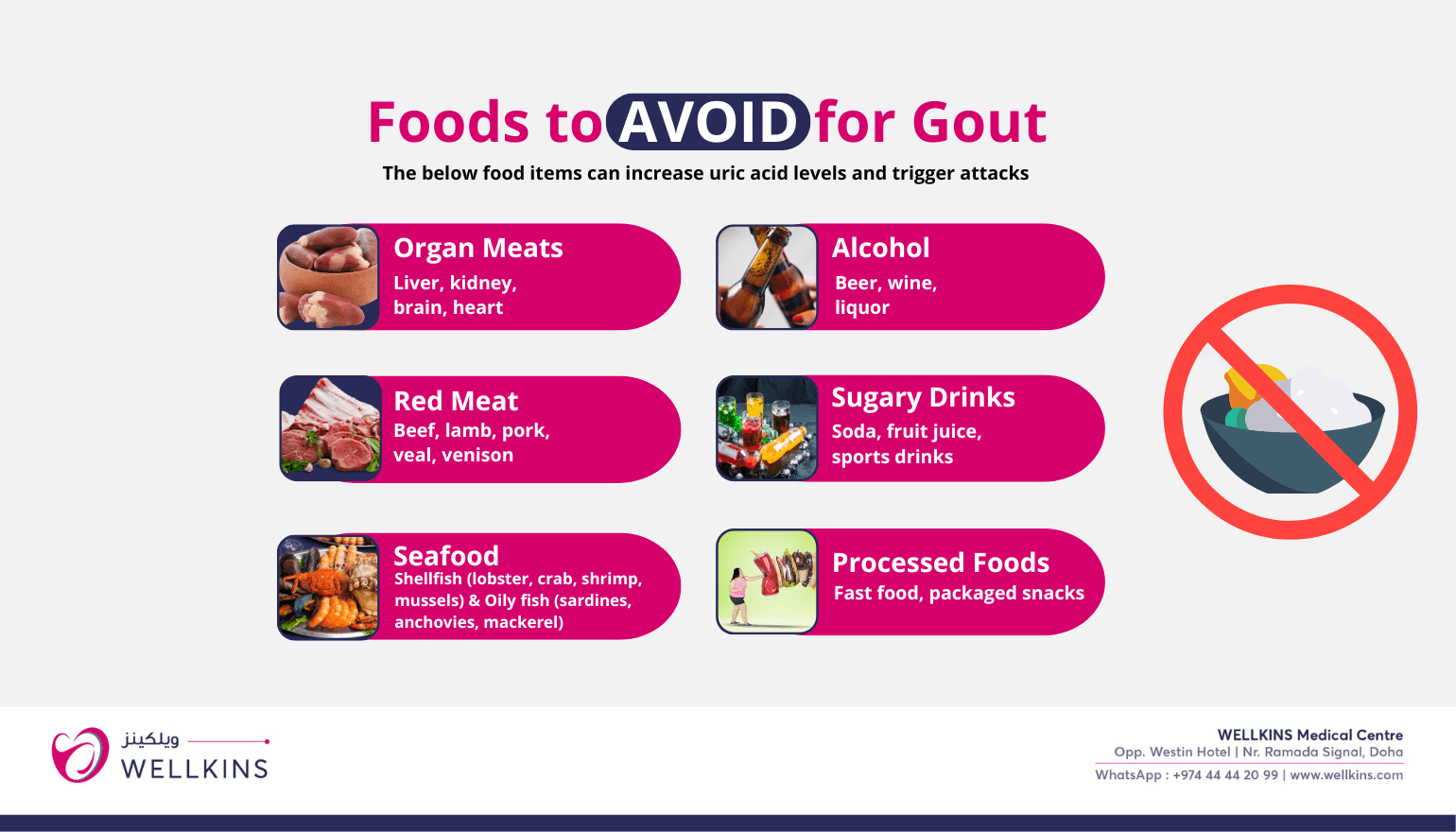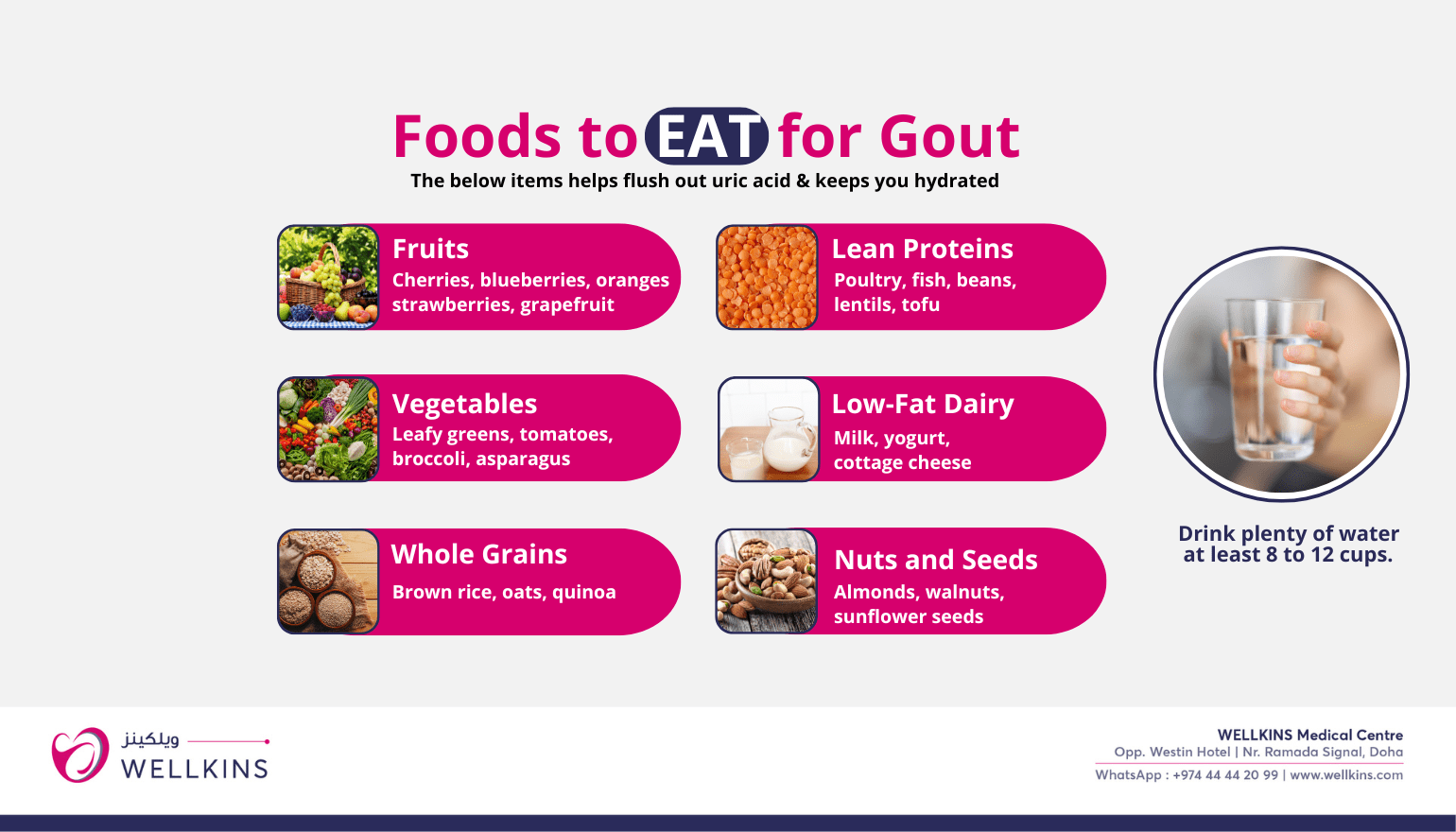Author: Dr.Jacob Neil (Consultant – Internal Medicine – WELLKINS Medical Centre)
Gout is a painful type of arthritis caused by excessive uric acid in the blood. This buildup of uric acid can form crystals in the joints, leading to inflammation and severe pain. While the big toe is commonly affected, gout can also impact other joints like the ankles, knees, elbows, wrists, and fingers.
The body produces uric acid as a byproduct of breaking down a chemical called purine, which is naturally present in the body and certain foods. Normally, the body eliminates uric acid through urine. However, when uric acid levels become too high, it can lead to gout attacks.
Understanding Gout attacks
Gout attacks are characterized by sudden, intense pain and inflammation in the affected joint, often the big toe. These symptoms typically begin at night and may last for several hours or days. The affected joint may become red, swollen, and warm to the touch. As the attack progresses, movement of the joint may become limited.
While the acute pain may subside after a few days or weeks, lingering discomfort may persist. Over time, gout attacks may become more frequent, last longer, and affect multiple joints.
Following a gout attack, it is vital to bring down your uric acid level through lifestyle measures and medication, so as to minimise the chance and severity of future gout attacks. -Dr.JACOB NEIL (Consultant – Internal Medicine at WELLKINS Medical Centre)

Frequency of Gout Attacks
Gout attacks can vary in frequency. Initially, they may occur infrequently, perhaps once or a few times every few years. However, as the condition progresses, attacks can become more frequent, occurring several times a year.
Causes of Gout
Gout is caused by an excess of uric acid in the blood. Uric acid is a waste product that is normally dissolved in the blood and excreted by the kidneys. When uric acid levels are too high, it can crystallize in the joints, causing inflammation and pain.
Several factors can contribute to high uric acid levels, including:
- Age and gender: Men are more likely to develop gout than women, especially before menopause.
- Diet: Consuming excessive amounts of meat, seafood, and fructose-containing beverages can raise uric acid levels.
- Family history: A family history of gout increases your risk.
- Medical conditions: Conditions like high blood pressure, diabetes, and kidney disease can contribute to gout.
- Medications: Certain medications may increase the risk of gout.
- Obesity: Being overweight can elevate uric acid levels.
What food items should be avoided in gout?

Food items that are considered to be of benefit in gout:
Observe a balanced healthy diet to maintain a healthy weight. A healthy balanced diet consists of:
Carbs: Consume more complex carbs (like oats and brown rice) rather than processed food. Avoid white bread, cake, candy and sweet drinks.
Fats: Cut down on saturated fats from red meats, fatty poultry and high-fat dairy products.
Water: Drink 8 to 12 cups of water a day
Protein: Eat plant-based protein from beans and nuts, or eat lean meat, poultry fish and low fat dairy products
Vegetables and fruits: Eat more from this group.
Please note: High-purine vegetables do not cause gout
“My Healthy Plate is a good guide to follow. Eat a quarter plate of complex carbs like oats and brown rice. Avoid refined carbohydrates. Also, eat half a plate of all kinds of vegetables. Lastly, fill the last quarter of your plate with plant-based or low-fat protein. This can include bean curd, tempeh and dhal.”

Can exercise prevent gout attacks?
Yes. Regular exercise is beneficial for preventing gout attacks. Aim for at least 150 to 300 minutes of moderate-intensity activity per week. Activities like brisk walking, cycling, or swimming are excellent choices. Additionally, incorporating strength training exercises at least twice a week can provide a well-rounded and sustainable approach to long-term health.
By making dietary changes, exercising regularly, and managing your weight, you can significantly reduce your risk of gout attacks. If you have gout, working closely with your healthcare provider can help you manage the condition and improve your quality of life.






